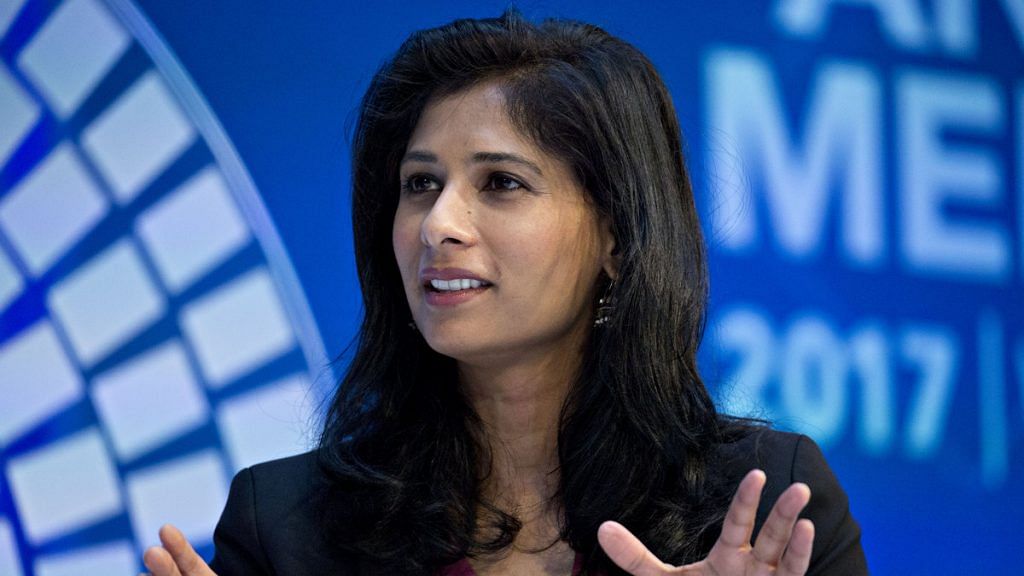New Delhi: Faced with the threat of the Omicron variant of the novel coronavirus, governments across the globe will have much less room to spend to provide support to their economies and sustain economic recovery, said the International Monetary Fund’s chief economist, Gita Gopinath.
“If we now have another prolonged health crisis, countries are going to have to deal with it with debt levels that are much higher than they were in 2020. They have much less space to spend on the policies on which they did in the previous run. Central banks have to now realise that inflation can become entrenched, and they might have to move more quickly on raising interest rates,” Gopinath told ThePrint’s Editor-in-Chief Shekhar Gupta on Off The Cuff.
The full conversation with be telecast on ThePrint’s YouTube channel Friday, 17 December, at 7 pm.
She estimates that globally, governments have provided a total of $17 trillion in fiscal support to mitigate the economic impact of Covid-19.
As a response to the pandemic, advanced economies like the United States, the United Kingdom and Germany have provided income support by transferring money into their citizens’ accounts. India, meanwhile, has largely restricted itself to providing credit lines to small and medium-sized businesses, free foodgrains to beneficiaries under the Pradhan Mantri Garib Kalyan Ann Yojana, and more money for the Mahatma Gandhi National Rural Employment Guarantee Scheme.
Gopinath said that going forward, India must maintain its momentum on spending to provide the needed support to the economy.
“The advice to India is that fiscal policy must remain accommodative in the near term. And for this fiscal year, revenues have gone up in a strong way, but there is still spending that needs to be done. So, India must make sure that the fiscal deficit is not under-implemented,” she said.
The government has pegged the fiscal deficit for 2021-22 at 6.8 per cent of GDP. The fiscal deficit represents the gap between the government’s revenue and its expenditure.
Gopinath said that globally, demand for goods has come back strongly with more people making purchases online, and this has fed into inflation.
“The expectation was that in the second half of the year, the demand would rotate back from goods to services, that we would not have these pandemic-related disruptions, and then you would not see these pressures on inflation.”
With elevated levels of inflation globally, central banks in advanced economies are now indicating the need to increase interest rates. The US Federal Reserve expects three interest-rate hikes in 2022, while the Bank of England has emerged as the first major central bank to have hiked its key policy rate by 25 basis points as inflation pressures mount.
Back home, the Reserve Bank of India has said it would maintain an accommodative monetary stance as long as necessary to revive and sustain growth on a durable basis.
Also read: How Omicron will hurt global recovery: Economists spell out possibilities
Regulating crypto, short-term impact of demonetisation
On the need to regulate private digital currencies, Gopinath said the IMF is opposed to cryptocurrencies being used as a legal tender, but countries must utilise the underlying technology.
“This needs to be regulated without a doubt. The fact is that if you are a financial institution and if you have exposure to these crypto assets, you make sure you have capital buffers just as you would while investing in risky asset classes. We are opposed to cryptocurrencies being used as legal tender.”
India is currently in the process of finalising a law to regulate private cryptocurrencies, known as The Cryptocurrency and Regulation of Official Digital Currency Bill, 2021.
Calls for regulation have increased as the cryptocurrency market has grown. While the government does not record transactions in cryptocurrencies, private estimates have pegged the market at $75 million in 2020-21.
When asked about the impact of demonetisation on the domestic economy before the pandemic, Gopinath said this had caused India to lose 2 per cent of its GDP in the near-term, but she still does not see any risks to growth in the long-term.
“I will not say the effect of demonetisation was small. It was around 2 per cent of the GDP. But the evidence that we looked at did not suggest that there were quantitatively meaningful long-term effects for multiple years. Once cash started coming back into the system, those effects got unwound.”
On 8 November 2016, Prime Minister Narendra Modi announced that high-denomination 500- and 1000-rupee notes would cease to be legal tender from midnight to curb the use of black money in the economy. The announcement created tremors across the country, deeply affecting the poor and small businesses that survived purely on cash transactions.
(Edited by Rohan Manoj)
Also read: Investors know China’s economy is slowing down. But they don’t know how bad it is
